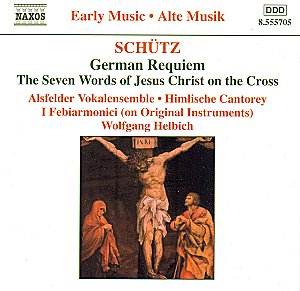Heinrich
Schütz often known as "The Father of German Music"
was the leading German choral composer of the early to middle
baroque. Schütz travelled to Italy more than once during
his lifetime, studying in Venice with the master composers: Giovanni
Gabrieli and possibly with Monteverdi. Schütz thoroughly
internalised the Venetian polychoral concertato style, giving
equal weight to both voices and instruments, which is the predominant
style of his works, particularly in the three books in nine volumes
of the Symphoniae sacrae which were composed 1629-50. This unlikely
fusion of Gabrieli’s Italian school and Protestant Germany
was cutting-edge music and we are told that the German performers
of Schütz’s day found the requirements of the Italian
style technically extremely difficult to perform.
Schütz managed to achieve a remarkable tenure
of fifty-seven out of his eighty-seven year life as Kapellmeister
at the Electorial Court in Dresden. Much of his choral music that
survives was composed for liturgical purposes and in addition
to the Symphoniae sacrae and the two major works contained on
this release, the Cantiones sacrae (1625) and the Symphoniarum
sacarum secunda pars (1647) are significant examples together
with numerous oratorios, passions, madrigals and motets.
The Prince Heinrich Posthumus of Reuss requested
Schütz to compose a work for his funeral; which was following
the custom of arranging his funeral arrangements in advance of
his death. The result was the magnificent three movement Musicalisches
Exequien (German Requiem) composed in 1636 which contained a tribute
in verse to the Prince. The first movement is entitled Concerto
in the form of a German funeral mass which is intended for six
singers and organ. The middle movement is a motet: Lord, if I
have only thee for eight unaccompanied singers and two choirs.
The work concludes with a setting of the Nunc dimittis for two
choirs. Characteristically the work is extremely strong and concentrated
and the performers offer an interpretation of admirable conviction
and precision with the significant demands of this rich and varied
score.
The Seven Words of Jesus Christ on the Cross
dates from 1645-46 and uses traditional texts drawn from the four
evangelists, utilising various vocal combinations and instrumentation.
The soloists, choir and orchestra are in outstanding form throughout
the distinctive and expansive score. The depth of feeling offered
by the principals is exceptional, with significant dramatic expression
combined with conviction and appropriate reverence.
The short five voice setting with basso continuo
Die mit Tranen saen (They that sow in tears) is taken from Psalm
XXVI and is the tenth in a set of motets included in Schütz’s
collection Musicalia ad Chorum Sacrum or Geistliche Chor-Musik
which was published in 1648. The release concludes with the even
briefer eleventh motet in the collection So fahr ich hin zu Jesu
Christ (So onward I go to Jesus Christ) which is also for five
voices and basso continuo and is a setting taken from a well-known
funeral chorale. In these pieces one cannot fail to be impressed
with the finely blended performances of the soloists which provide
significant satisfaction.
The talented soloists are entirely convincing
throughout and superbly recorded too. Although it seems unfair
to single out individuals in this superb team achievement I particularly
enjoyed hearing the dazzling voices of principal soprano Veronika
Winter and tenor Jan Kobow. It is hard to fault this release and
special praise must go to Berlin born conductor Wolfgang Helbich
for his sterling direction of the two specialist early-music vocal
ensembles the Alsfelder Vokalensemble (which he founded), Himlische
Cantorey and the period-instrument orchestra I Febiarmonici. Although
a relatively young baroque orchestra I Febiarmonici using historic
performance practice have attracted critical acclaim since their
inception in 1998 and provide exquisite and refined playing.
As we have come to expect from Naxos the booklet notes by Keith
Anderson are interesting, informative and detailed. It may be
my rapidly ageing eyes but is the size of the Naxos print getting
smaller? The sound quality approaches demonstration standard.
This is an exceptional recording of the highest
possible quality from Naxos. Heinrich Schütz is a major figure
and will gain many new supporters to his rich and colourful music.
It provides major rewards. Wonderful!
Michael Cookson


